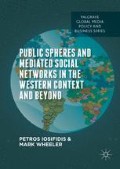Abstract
This chapter addresses how the social media have become a more profound force in shaping international values throughout the wider diplomatic community. It examines the changing nature of public and cultural diplomacy (PCD) within the context of evolving global communications. It also considers the extent to which the social media may facilitate the use of new ‘currencies’ of dialogue, outreach and propagation of opinion as key bargaining tools. It concludes by considering whether such employment of soft power really equates to a democratisation of foreign policies, or rather, reflects a reconfiguration of elite interests within the international order.
Access this chapter
Tax calculation will be finalised at checkout
Purchases are for personal use only
Notes
- 1.
It should also be noted that other nation-states such as Sweden and Switzerland have developed sophisticated public diplomacy 2.0 policies.
Bibliography
Barbrook R. 2007. Imaginary Futures: From Thinking Machines to the Global Village. London: Pluto Press.
Bernays E. 1928. Propaganda. New York: Horace Liveright.
Cull N.J. 2011. “WikiLeaks, Public Diplomacy 2.0 and the State of Digital Public Diplomacy”. Place Branding and Public Diplomacy 7(1): 1–8.
Cull N.J. 2012. “The Long Road to Public Diplomacy 2.0: The Internet in U.S. Public Diplomacy”, Paper Presented to the workshop on ‘International Relationships in the Information Age,’ International Studies Association, Harvard University. http://www.ash.harvard.edu/extension/ash/docs/cull.pdf (accessed June 18, 2014).
Cull N.J. 2013. “The Long Road to Public Diplomacy 2.0: The Internet in U.S. Public Diplomacy”. International Studies Review 15(1): 123–139.
De Waal, A. 2012. Don’t Elevate Kony, World Peace Foundation, March 10. http://sites.tufts.edu/reinventingpeace/2012/03/10/dont-elevate-kony/ (accessed June 18, 2014).
Fattor E.M. 2014. American Empire and the Arsenal of Entertainment: Soft Power and Culture Weaponization. Basingstoke: Palgrave MacMillan.
Fletcher T. 2012. “The Naked Diplomat”, Foreign and Commonwealth Office Global Conversation Blog, October 2. http://blogs.fco.gov.uk/tomfletcher/2012/10/02/the-naked-diplomat (accessed June 18, 2014).
Gao H., G. Barbier, and R. Goolsby. 2011. “Harnessing the Crowdsourcing Power of Social Media for Disaster Relief”. Cyber-Physical-Social Systems 26: 10–14. Arizona: IEEE Computer Systems.
Glassman J.K. 2008. “Public Diplomacy 2.0: A New Approach to Global Engagement”, United States State Department Archive, December 1. http://20012009.state.gov/r/us/2008/112605.htm (accessed June 18, 2014).
Hall S., C. Critcher, T. Jefferson, J. Clarke, and B. Roberts. 1978. Policing the Crisis: Mugging, the State and Law and Order. London: MacMillan.
Hayden C. 2012. “Social Media at State: Power, Practice, and Conceptual Limits for US Public Diplomacy”. Global Media Journal 11(12): 1–21.
Harris B. 2013. “Diplomacy 2.0: The Future of Social Media in Nation Branding”. Exchange: The Journal of Public Diplomacy 4(1): 17–32.
Herman, E., and N. Chomsky. 2009. “The Propaganda Model after 20 Years: Interview with Edward S. Herman and Noam Chomsky” by Andrew Mullen, Westminster Papers in Communication and Culture, November. http://www.chomsky.info/interviews/200911--.htm (accessed June 18, 2014).
Hocking B. 2005. “Rethinking the ‘New’ Public Diplomacy”. In The New Public Diplomacy: Soft Power in International Relations, ed. J. Melissen. Basingstoke: Palgrave MacMillan.
Kent, M. 2013. Invited Talk to London Metropolitan University Diplomacy Students. February 28. http://www.londonmet.ac.uk/news/news-stories/university-news-2013/university-news-february/lmnews-ambassador-visit-sums-up-diplomacy-course (accessed June 18, 2014).
Khatib L., W. Dutton, and M. Thelwall. 2012. “Public Diplomacy 2.0: A Case Study of the US Digital Outreach Team”. The Middle East Journal 66(3): 453–472.
McHale J.A. 2011. Opening Remarks at the Council on Foreign Relations: A Review of U.S. Public Diplomacy. New York. June 21.
Melissen J. 2011. Beyond the New Public Diplomacy. Clingendael Paper No. 3. October 2011. Amsterdam: Netherlands Institute of International Relations.
Mytko G. 2012. The United Kingdom and the Rise of Digital Public Diplomacy, Exchange: The Journal of Public Diplomacy, September 28. http://www.exchangediplomacy.com/the-united-kingdom-and-the-rise-of-digital-publicdiplomacy (accessed June 18, 2014).
Newsweek Staff. 2009. The Man Who Sells America Abroad, Newsweek, February 2. http://www.newsweek.com/man-who-sells-america-abroad-77853 (accessed June 18, 2014).
Nicolson H. 1939. Diplomacy: a Basic Guide to the Conduct of Contemporary Foreign Affairs. London: Harcourt Brace & Co.
Nye J.S. 2002. “The Information Revolution and American Soft Power”. Asia-Pacific Review 9(1): 60–76.
Nye J.S. 2004. Soft Power: The Means to Success in World Politics. New York: Public Affairs.
Pigman G.A. 2010. Contemporary Diplomacy: Representation and Communication in the Global World. Cambridge: Polity Publishers.
Powell C. 2001. quoted from Selling a Nation, Marketing Week, November 8.
Puttnam D. 1997. The Undeclared War: The Struggle for Control of the World’s Film Industry. London: HarperCollins.
Quinn G. 2014. Speech Almaty Kazakhstan: British Diplomacy in the Information Age, Gov.UK, April 3. https://www.gov.uk/government/speeches/british-diplomacy-in-the-information-age (accessed June 18, 2014).
Sandre A. 2013. Global Interconnectivity, Social Diplomacy and Non-state Actors, Huffington Post. April 12. http://www.huffingtonpost.com/andreas-sandre/global-interconnectivity-_b_3071557.html (accessed June 18, 2014).
Segrave K. 1997. American Film Abroad: Hollywood Domination of the World’s Movie Screens. Jefferson, NC: McFarland & Co.
Seib P. 2012. Real-Time Diplomacy: Politics and Power in the Social Media. Basingstoke: Palgrave MacMillan.
Shirky C. 2011. The Political Power of Social Media: Technology, the Public Sphere, and Political Change, Foreign Affairs, January/February issue. http://www.foreignaffairs.com/articles/67038/clay-shirky/the-political-power-of-social-media (accessed March 21, 2014).
Sunstein C. 2007. Republic.com 2.0. Princeton, NJ: Princeton University Press.
Thrall A.T., D. Stecula, and D. Sweet. 2014. “May We Have Your Attention Please? Human-Rights NGOs and the Problem of Global Communication”. International Journal of Press/Politics 19(1): 1–22.
Wiseman, G. 2010. ‘Polylateralism’: Diplomacy’s Third Dimension. Public Diplomacy Magazine 1: 24–39.
Zaharna R.S., and W.A. Rugh. 2012. “Issue Theme: The Use of Social Media in U.S. Public Diplomacy—Guest Editors Note”. Global Media Journal 11(12): 1–8.
Author information
Authors and Affiliations
Copyright information
© 2016 The Editor(s) (if applicable) and The Author(s)
About this chapter
Cite this chapter
Iosifidis, P., Wheeler, M. (2016). Public Diplomacy 2.0 and the Social Media. In: Public Spheres and Mediated Social Networks in the Western Context and Beyond. Palgrave Global Media Policy and Business. Palgrave Macmillan, London. https://doi.org/10.1057/978-1-137-41030-6_7
Download citation
DOI: https://doi.org/10.1057/978-1-137-41030-6_7
Published:
Publisher Name: Palgrave Macmillan, London
Print ISBN: 978-1-137-41029-0
Online ISBN: 978-1-137-41030-6
eBook Packages: Literature, Cultural and Media StudiesLiterature, Cultural and Media Studies (R0)

